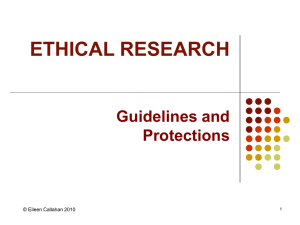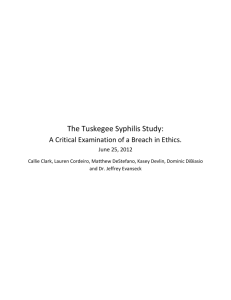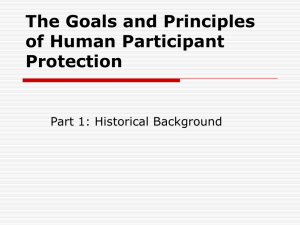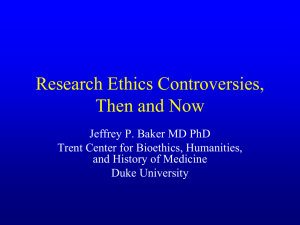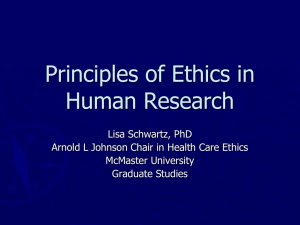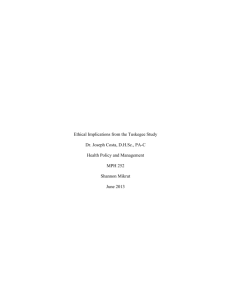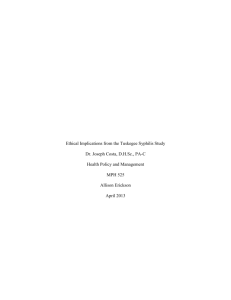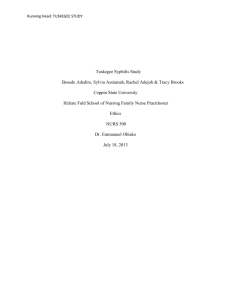Tuskegee Experiment
advertisement
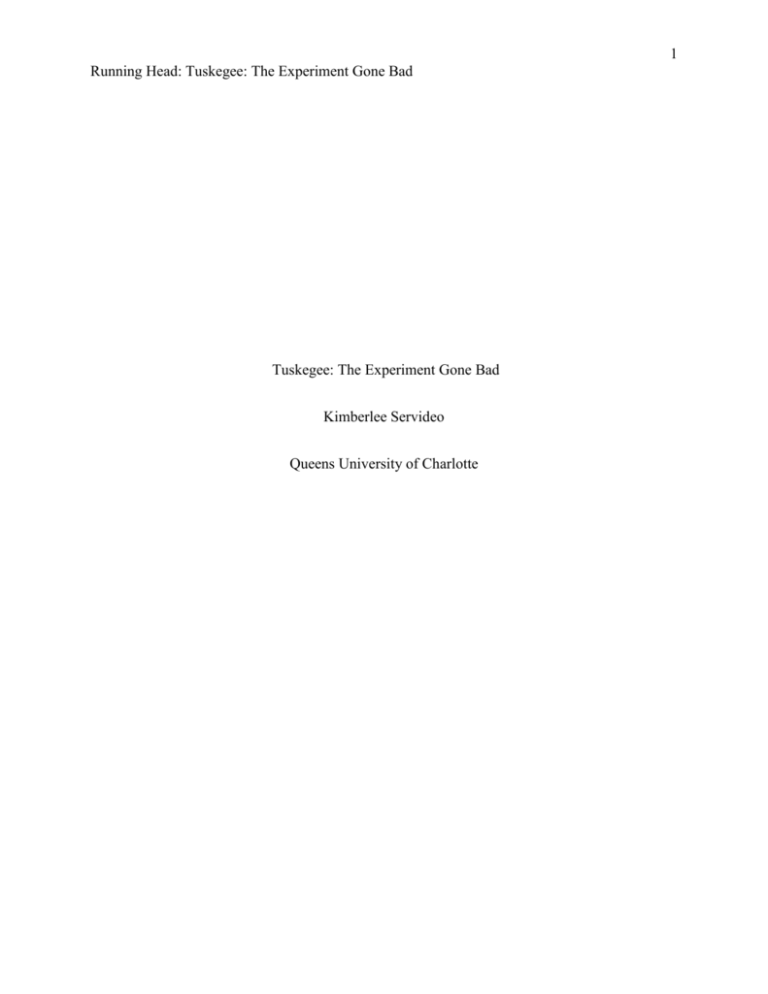
1 Running Head: Tuskegee: The Experiment Gone Bad Tuskegee: The Experiment Gone Bad Kimberlee Servideo Queens University of Charlotte 2 Running Head: Tuskegee: The Experiment Gone Bad Introduction Eighty one years ago, the “Tuskegee Study of Untreated Syphilis in the Negro Male” was at its starting point. This study was started by the Public Health Service, who teamed up with the Tuskegee Institute, to record the natural history of syphilis in hopes of justifying treatment programs for blacks (Chadwick, 2002). They gathered together 399 poor, black men from Macon County, Alabama that had syphilis. A factor that went into their decisions on narrowing down the subjects: being uneducated. This study went on to becoming a government sanctioned medical investigation (Walker, 2009). About The Study The researcher’s scientific objective for this study was to find out what syphilis does to the untreated body. “For a few months the men received exceedingly low, nontherapeutic doses of mercurial ointment and bismuth, which were the somewhat effective, but quite toxic treatments of the day” (Walker, p. 5, 2009). As far as further treatments, there was not enough funding. Nonetheless, the US Public Health Service investigators continued to salvage what work was done by assembling data on spontaneous evolution of syphilis and how it affects African American males (Walker, 2009). The original intent was to compare the morbid symptoms of the untreated syphilis documented at Tuskegee with results that were found in a previous study in Olso, Norway. However, the two studies had one big, distinct difference: The Olso study consisted of information researchers compiled together from white men that had syphilis that were untreated for quite some time before the study even started in 1928 (Walker, 2009). What’s Unethical Related to the Tuskegee Experiment? 3 Running Head: Tuskegee: The Experiment Gone Bad According to Roger Wimmer and Jospeh Dominick, authors of the book Mass Media Research, ethics is defined as “distinguishing right from wrong and proper from improper” (Wimmer & Dominick, p. 65, 2013). Researchers are expected to have the highest respect for conducting their work as ethically as possible. If they don’t, they hold the potential to affect further studies. If a participant that volunteered to take part in a study found out that the information they were given was manipulated in any way, or they were given false information, that’s unethical. Furthermore, those participants may decide to never volunteer to be part of a study after that. “Since mass media research depends on the continued goodwill and cooperation of respondents, it is important to shield them from unethical research practices (Wimmer & Dominick, p. 65, 2013). Unfortunately, the researchers in the Tuskegee experiment went about everything very unethically. Two specific ethical problems that they violated were voluntary participation and informed consent. First, let’s define the two so we understand what it means and how they could be misrepresented. Voluntary participation is basically having the option to say yes and accept participation in a research experiment, survey, questionnaire, etc. or having the option to say no and decline participation in all of the above. When the researchers were searching for their human guinea pigs, they originally had a group of 600 poor, black, uneducated men; however, only 399 of them had syphilis, which is how they ended up with that number of subjects. The only thing these men were told was that they were being treated for “bad blood”. Problem number one: these educated and esteemed men and women of science purposely searched for the criteria they wanted- a poor, uneducated black man with syphilis- with the intention of being deceitful. These unfortunate subjects weren’t even told that they were being involved in an experiment, let alone asked if they gave their consent to do so. 4 Running Head: Tuskegee: The Experiment Gone Bad The next ethical problem was informed consent: “Researchers have the responsibility to inform potential subjects or respondents of all features of the project that can reasonably be expected to influence participation” (Wimmer & Dominick, p. 69, 2013). In retrospect, it is only fair that those who are being asked to volunteer and participate know enough specifics about the project so that they can make a smart choice. Some specifics might include that participants be informed of any possible discomfort and/or unpleasantness; if there will be any odd measurement techniques the researchers might use, it is imperative that the participants know before committing to the experiment (Wimmer & Dominick, 2013). There are endless courtesies that researchers should disclose with any and all participants. A few examples are: “The purpose of the research, expected duration, and procedures; the subject’s right to decline to participate and to withdraw from the research once participation has begun; whom to contact for questions about the research and research participant’s rights, etc.” (Wimmer & Dominick, p. 71, 2013). These are just a few of the many things that should be disclosed, yet not one of these was given to the subjects of the Tuskegee experiment. I don’t feel right calling them participants, due to the fact that they weren’t even aware they were. “Misleading letters were sent to the participants encouraging their submission to painful diagnostic procedures and post-mortem autopsies” (Walker, p. 5, 2009). That has unethical written all over it. A big reason as to why the researchers got away with this, as well as every other unethical angle they played was because of what they leveraged with. Since this was in the era of the Great Depression, they coerced the subjects with incentives such as, “Hot meals on exam days, transportation to town, free care for minor ailments, and a $50 burial insurance policy” (Wimmer & Dominick, p. 5, 2013). 5 Running Head: Tuskegee: The Experiment Gone Bad Conclusion Although this awfully tainted experiment was originally conducted back in 1932, it’s a shame that those so-called esteemed men and women of science would commit such unethical acts. Being that research was part of their science profession, you would think that this would never be an option even for the simple fact that any results or conclusion they come to from this would never be 100% accurate. It is extremely important to ensure that all the information on your research experiment is expressed to all those who volunteer to participate, along with the option of saying yes or no. According to the text, “Researchers who deal with human subjects must ensure that all precautions are taken to avoid any potential harm to subjects” (Wimmer & Dominick, p. 85, 2013). 6 Running Head: Tuskegee: The Experiment Gone Bad References Walker, C. A. (2009). Lest we forget: The tuskegee experiment. Journal of Theory Construction and Testing, 5-6. Wimmer, R., & Dominick, J. (2013). Mass media research. (10th ed., pp. 65-85). Boston, MA: Wadsworth Cengage Learning. Chadwick, A. (Performer) (2002). Remembering tuskegee [Radio series episode]. Washington, DC: NPR. Retrieved from http://www.npr.org/programs/morning/features/2002/jul/tuskegee/
